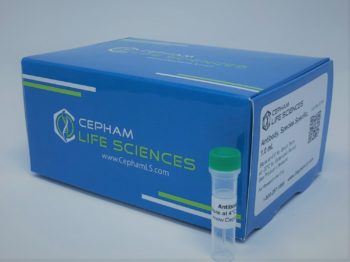Description
Aliases
R51H3, RAD51 homolog D, RAD51-like protein 3, TRAD, RAD51D, RAD51L3
Antibody Type
Polyclonal Antibody
Species
Human
Uniprot ID
O75771
Immunogen
Recombinant human DNA repair protein RAD51 homolog 4 protein (1-328AA)
Raised In
Rabbit
Species Reactivity
Human
Tested Applications
ELISA, WB, IHC;Recommended dilution:WB:1:200-1000, IHC:1:20-1:200
Background / Function
Involved in the homologous recombination repair (HRR) pathway of double-stranded DNA breaks arising during DNA replication or induced by DNA-damaging agents. Bind to single-stranded DNA (ssDNA) and has DNA-dependent ATPase activity. Part of the Rad21 paralog protein complex BCDX2 which acts in the BRCA1-BRCA2-dependent HR pathway. Upon DNA damage, BCDX2 acts downstream of BRCA2 recruitment and upstream of RAD51 recruitment. BCDX2 binds predominantly to the intersection of the four duplex arms of the Holliday junction and to junction of replication forks. The BCDX2 complex was originally reported to bind single-stranded DNA, single-stranded gaps in duplex DNA and specifically to nicks in duplex DNA. Involved in telomere maintenance. The BCDX2 subcomplex XRCC2:RAD51D can stimulate Holliday junction resolution by BLM.
Isotype
IgG
Conjugate
Unconjugated
Storage Buffer
PBS with 0.02% sodium azide, 50% glycerol, pH7.3.
Form
Liquid
Storage
Shipped at 4°C. Upon delivery aliquot and store at -20°C or -80°C. Avoid repeated freeze.
Purity
Antigen Affinity Purified
Literature
[1]Structural and functional characterization of the N-terminal domain of human Rad51D.” Kim Y.M., Choi B.S.Int. J. Biochem. Cell Biol. 43:416-422(2011). [2]Rad51 paralog complexes BCDX2 and CX3 act at different stages in the BRCA1-BRCA2-dependent homologous recombination pathway.”Chun J., Buechelmaier E.S., Powell S.N.Mol. Cell. Biol. 33:387-395(2013). [3]Germline mutations in RAD51D confer susceptibility to ovarian cancer.” Loveday C., Turnbull C., Ramsay E., Hughes D., Ruark E., Frankum J.R., Bowden G., Kalmyrzaev B., Warren-Perry M., Snape K., Adlard J.W., Barwell J., Berg J., Brady A.F., Brewer C., Brice G., Chapman C., Cook J. Rahman N.Nat. Genet. 43:879-882(2011).Additional information
| Size | 50μl, 100μl |
|---|


